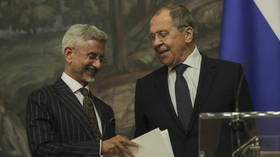Buying Russian oil in India’s best interests – foreign minister

Indian Foreign Minister Subrahmanyam Jaishankar said on Sunday that New Delhi acted in its best interests when it decided to continue buying oil from Russia despite pressure from the West.
Speaking on the country’s foreign policy priorities, including its position on the ongoing Middle East crisis, Jaishankar emphasized the importance of “good governance” and having a “consistent position” on pressing issues such as terrorism.
“There was a lot of attention over our strong stance on our right to buy oil from Russia,” Jaishankar said in a speech in Bhopal, Madhya Pradesh. “Had we not exercised that option, think what difference it would have made to you, think how much higher your petroleum prices would have been, think how much inflation would have gone up in this country.”
“A strong government stands up for its people,” Jaishankar said, adding that just as “good governance” is required at home, “right judgements” are necessary abroad. “The same countries in Europe who asked us not to buy oil from Russia, were buying oil from Russia themselves,” he stated, noting that “every other country looks after the welfare of its people, its economic interests.”
His comments come as trade between Russia and India has hit an all-time high, with turnover for goods in January-August already surpassing the total for the previous year. According to data from the Indian Ministry of Commerce and Industry, total trade between the two countries in the first eight months of the year reached $43.8 billion.
India’s imports of Russian oil surged by 80% year-on-year to an average of 1.56 million barrels per day (bpd) in September. Imports of Russian coking coal also jumped by 2.3 times year-on-year over the first eight months of 2023, reaching 4.3 million tons.
Jaishankar also weighed in on the Israel-Palestine conflict, without naming either country, stressing the need to be consistent in its stance against terrorism.
“We take a strong position [on terrorism] because we are big victims of terrorism,” Jaishankar said. He also warned that India would lose credibility if it said terrorism that affects other countries is “not so serious.”
New Delhi has been walking a diplomatic tightrope on the Israel-Palestine conflict since the Hamas attack on October 7 that killed at least 1,300 people. Israel’s retaliation for the attack has killed over 8,000 Palestinians, most of them women and children, according to the latest data from the Gaza Health Ministry.
Indian Prime Minister Narendra Modi was one of the first world leaders to condemn the Hamas attack. In a phone call with his Israeli counterpart, Benjamin Netanyahu, Modi “unequivocally” condemned terrorism in all forms and manifestations.
The Indian Foreign Ministry, however, was quick to clarify New Delhi’s position on Palestine, reiterating its support for a two-state solution to resolve the dispute, while assuring continued assistance to Palestinians affected by war. Modi expressed “shock” after the bombing of the Al Ahli Hospital in Gaza which killed several hundred people, saying “civilian casualties in the ongoing conflict are a matter of serious and continuing concern.”













